Shows

The Joy of WhyHow Can Math Protect Our Data?Every time data travels — from smartphones to the cloud, or across the vacuum of space — it relies on a silent but vigilant guardian in the form of error-correcting codes. These codes, baked into nearly every digital system, are designed to detect and repair any errors that noise, interference or cosmic rays might inflict.In this episode of The Joy of Why, Stanford computer scientist Mary Wootters joins co-host Steven Strogatz to explain how these codes work, and why they matter more than ever. Wootters discusses the evolving list of codes that keep modern communication resilient, and the fron...
2025-08-0739 min
The Joy of WhyHow Can Regional Models Advance Climate Science?Climate models have changed the way we view the world. While effective, these models are imperfect, and scientists are constantly looking at ways to improve their accuracy and predictability.MIT professor Elfatih Eltahir has spent decades developing complex models to understand how climate change affects vulnerable regions like the Nile Basin and Singapore. In this episode of The Joy of Why, Eltahir tells co-host Steven Strogatz how growing up near the Nile in Sudan helped him realize that climate change doesn’t occur in isolation. To better understand climate-related impacts and to create more effective adaptation strategies, El...
2025-07-1045 min
The Joy of WhyDoes Form Really Shape Function?What links a Möbius strip, brain folds and termite mounds? The answer is Harvard University’s L. Mahadevan, whose career has been devoted to using mathematics and physics to explore the form and function of common phenomena.Mahadevan, or Maha to his friends and colleagues, has long been fascinated by questions one wouldn’t normally ask — from the equilibrium shape of inert objects like a Möbius strip, to the complex factors that drive biological systems like morphogenesis or social insect colonies.In this episode of The Joy of Why, Mahadevan tells co-host Steven Strogatz...
2025-06-1247 min
The Joy of WhyHow Did Geometry Create Modern Physics?Geometry is one of the oldest disciplines in human history, yet the worlds it can describe extend far beyond its original use. What began thousands of years ago as a way to measure land and build pyramids was given rigor by Euclid in ancient Greece, became applied to curves and surfaces in the 19th century, and eventually helped Einstein understand the universe.Yang-Hui He sees geometry as a unifying language for modern physics, a mutual exchange in which each discipline can influence and shape the other. In the latest episode of The Joy of Why, He tells...
2025-05-1546 min
The Joy of WhyS4 Preview: More Big Questions and No SasquatchesHow did complex life evolve? Where did space-time come from? Will computers ever understand language like we do? How did geometry create modern physics? These are just a few of the big and bold questions that we’ll be exploring in the latest season of Quanta’s interview podcast, “The Joy of Why,” starting March 20, and released every other Thursday.As ever, we will be talking to researchers and exploring the latest thinking on great scientific and mathematical questions of our time. But this season sees a new format, with the two of us — mathematician Steven Strogatz and physic...
2025-03-1317 min
The Joy of WhyHow Is Cell Death Essential to Life?Death might seem like a pure loss, the disappearance of what makes a living thing distinct from everything else on our planet. But zoom in closer, to the cellular level, and death takes on a different, more nuanced meaning. There is a challenge in simply defining what makes an individual cell alive or dead. Scientists today are working to understand the various ways and reasons that cells disappear, and what these processes mean to biological systems. In this episode, cellular biologist Shai Shaham talks to Steven Strogatz about the different forms of cell death, their roles in e...
2024-12-0538 min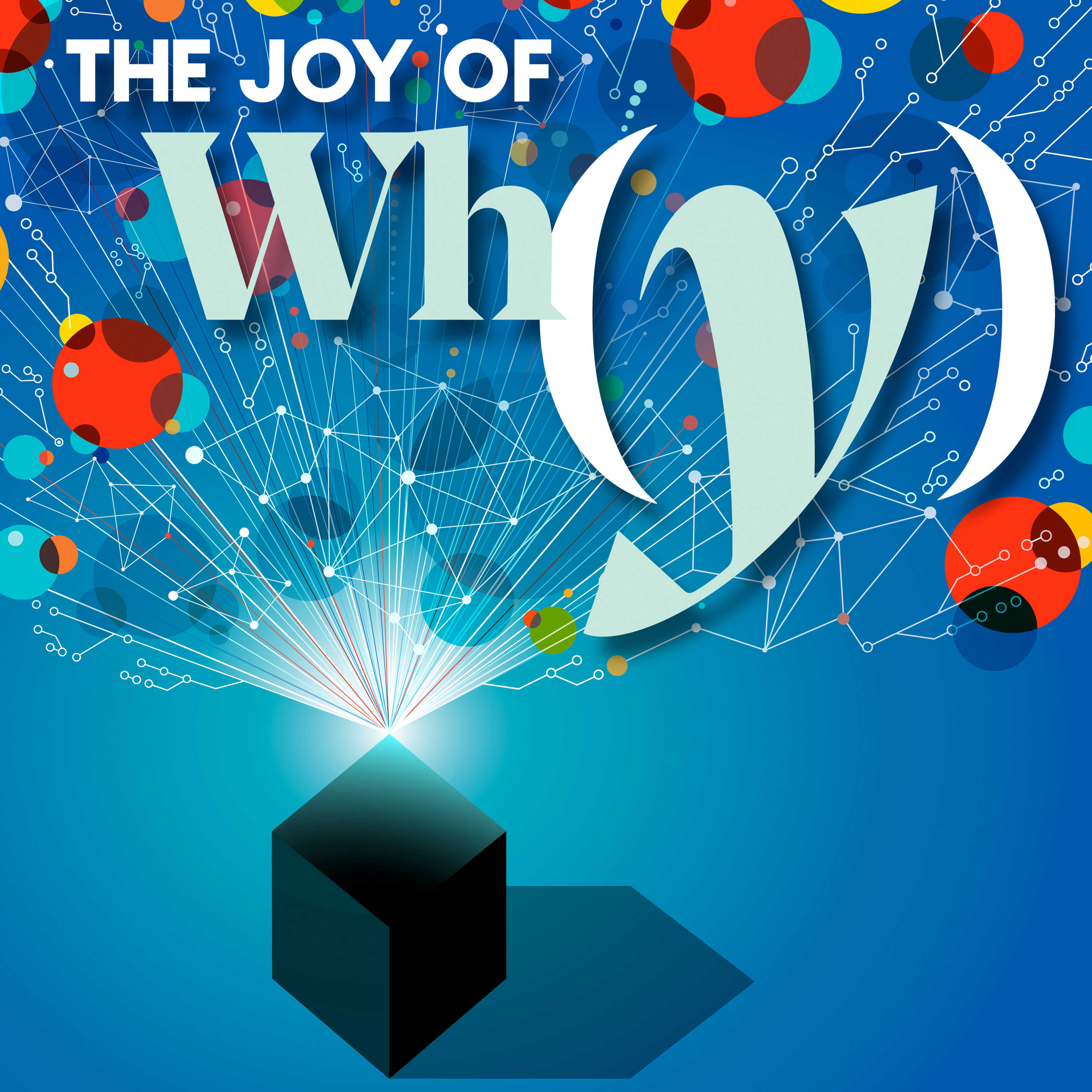
The Joy of WhyHow Is AI Changing the Science of Prediction?Scientists routinely build quantitative models — of, say, the weather or an epidemic — and then use them to make predictions, which they can then test against the real thing. This work can reveal how well we understand complex phenomena, and also dictate where research should go next. In recent years, the remarkable successes of “black box” systems such as large language models suggest that it is sometimes possible to make successful predictions without knowing how something works at all. In this episode, noted statistician Emmanuel Candès and host Steven Strogatz discuss using statistics, data science an...
2024-11-0737 min
The Joy of WhyWhy Is It So Hard to Define a Species?The “species” category is almost certainly the best known of all the taxonomic classifications that biologists use to organize life’s vast diversity. It’s a linchpin of both conservation policy and evolutionary theory, though in practice biologists have struggled to find a definition that works across the natural world. In this episode, Kevin de Queiroz, a zoologist and evolutionary biologist, talks with host Janna Levin about the variety of ways to conceive of a species, and ways to understand the relationships among living things.
2024-10-2430 min
The Joy of WhyHow Can Math Help Beat Cancer?When we think about medicine’s war on cancer, treatments such as surgery, radiation and chemotherapy spring to mind first. Now there is another potential weapon for defeating tumors: statistics and mathematical models that can optimize the selection, combination or timing of treatment. Building and feeding these models requires accounting for the complexity of the body, and recognizing that cancer cells are constantly evolving. In this episode, host Steven Strogatz hears from Franziska Michor, a computational biologist, about how our understanding of evolutionary dynamics is being used to devise new anticancer therapies.
2024-10-1042 min
The Joy of WhyWhat Can Cave Life Tell Us About Alien Ecosystems?If instruments do someday detect evidence of life beyond Earth, whether it’s in this solar system or in the farther reaches of space, astrobiologists want to be ready. One of the best ways to learn how alien life might function can be to study the organisms called extremophiles, which live in incredibly challenging environments on or in the Earth. In this episode, Penelope Boston, a microbiologist who has worked for many years with NASA, speaks with Janna Levin about the bizarre life found in habitats such as caves, how it would be possible to...
2024-09-2644 min
The Joy of WhyFrom Sidedoor — Cosmic Journey I: "Stellar Buffoonery"As a treat to our listeners, we are posting a full episode of Sidedoor, a podcast that explores the treasures in the Smithsonian's vaults. Subscribe to Sidedoor from Smithsonian wherever you listen to podcasts!Black holes could unlock the mysteries of creation and live at the heart of nearly every galaxy. But these invisible balls of extremely dense matter have never been fully understood, especially when they were only a theory. We travel through a cosmic wormhole back to the 1930s to learn how the first astrophysicist to successfully theorize a black hole, Subrahmanyan...
2024-09-1934 min
The Joy of WhyCan Thermodynamics Go Quantum?The principles of thermodynamics are cornerstones of our understanding of physics. But they were discovered in the era of steam-driven technology, long before anyone dreamed of quantum mechanics. In this episode, theoretical physicist Nicole Yunger Halpern talks to host Steven Strogatz about how physicists today are reinterpreting concepts such as work, energy and information for a quantum world.
2024-09-1243 min
The Joy of WhyDo We Need a New Theory of Gravity?Observations of the cosmos suggest that unseen sources of gravity — dark matter — tug at the stars in galaxies, while another mysterious force — dark energy — drives the universe to expand at an ever-increasing rate. The evidence for both of them, however, hinges on assumptions that gravity works the same way at all scales. What if that’s not true? In this episode, theoretical physicist Claudia de Rham explains her work on an alternative explanation called “massive gravity” to host Janna Levin.
2024-08-2942 min
The Joy of WhyAre Robots About to Level Up?Within just a few years, artificial intelligence systems that sometimes seem to display almost human characteristics have gone from science fiction to apps on your phone. But there’s another AI-influenced frontier that is developing rapidly and remains untamed: robotics. Can the technologies that have helped computers get smarter now bring similar improvements to the robots that will work alongside us? In this episode, Daniela Rus, a pioneering roboticist at the Massachusetts Institute of Technology, talks to host Steven Strogatz about the surprising inspirations from biology that may help robots rise to new levels.
2024-08-1538 min
The Joy of WhyAre Robots About to Level Up?Within just a few years, artificial intelligence systems that sometimes seem to display almost human characteristics have gone from science fiction to apps on your phone. But there’s another AI-influenced frontier that is developing rapidly and remains untamed: robotics. Can the technologies that have helped computers get smarter now bring similar improvements to the robots that will work alongside us? In this episode, Daniela Rus, a pioneering roboticist at the Massachusetts Institute of Technology, talks to host Steven Strogatz about the surprising inspirations from biology that may help robots rise to new levels.
2024-08-1538 min
The Joy of WhyHow Does Math Keep Secrets?Can you keep a secret? Modern techniques for maintaining the confidentiality of information are based on mathematical problems that are inherently too difficult for anyone to solve without the right hints. Yet what does that mean when quantum computers capable of solving many problems astronomically faster are on the horizon? In this episode, host Janna Levin talks with computer scientist Boaz Barak about the cryptographic techniques that keep information confidential, and why “security through mathematics” beats “security through obscurity.”
Listen on Apple Podcasts, Spotify, TuneIn or your favorite podcasting app, or you can stream it from Quanta.
2024-08-0236 min
The Joy of WhyHow Does Math Keep Our Secrets?Can you keep a secret? Modern techniques for maintaining the confidentiality of information are based on mathematical problems that are inherently too difficult for anyone to solve without the right hints. Yet what does that mean when quantum computers capable of solving many problems astronomically faster are on the horizon? In this episode, host Janna Levin talks with computer scientist Boaz Barak about the cryptographic techniques that keep information confidential, and why “security through mathematics” beats “security through obscurity.”
2024-08-0123 min
The Joy of WhyWill AI Ever Have Common Sense?Ask a question of ChatGPT and other, similar chatbots and there’s a good chance you’ll be impressed at how adeptly it comes up with a good answer — unless it spits out unrealistic nonsense instead. Part of what’s mystifying about these kinds of machine learning systems is that they are fundamentally black boxes. No one knows precisely how they arrive at the answers that they do. Given that mystery, is it possible that these systems in some way truly understand the world and the questions they answer? In this episode, the computer scientist Yejin Choi of the Universi...
2024-07-1844 min
The Joy of WhyWill AI Ever Have Common Sense?Common sense rules our world. This fundamental, sometimes trivial knowledge is inherent to how humans interpret language. Yet, some of these simple human truths are so obvious that they're rarely put into words. And without the data of common sense to train on, large language models such as ChatGPT have bizarre, often humorous blind spots.Yejin Choi, professor and the chair of computer science at the University of Washington, calls common sense the “dark matter” of intelligence. In this week’s episode of “The Joy of Why,” Choi talks with co-host Steven Strogatz about decoding t...
2024-07-1844 min
The Joy of WhyHow Is Tiling Without Repetition Possible?In the tiling of wallpaper and bathroom floors, collective repeated patterns often emerge. Mathematicians have long tried to find a tiling shape that never repeats in this way. In 2023, they lauded an unexpected amateur victor. That discovery of the elusive aperiodic monotile propelled the field into new dimensions.
The study of tessellation is much more than a fun thought exercise: Peculiar, rare tiling formations can sometimes seem to tell us something about the natural world, from the structure of minerals to the organization of the cosmos. In this episode, Janna Levin speaks with mathematician Natalie Priebe Frank a...
2024-07-0339 min
The Joy of WhyWhat Can Tiling Patterns Teach Us?In the tiling of wallpaper and bathroom floors, collective repeated patterns often emerge. Mathematicians have long tried to find a tiling shape that never repeats in this way. In 2023, they lauded an unexpected amateur victor. That discovery of the elusive aperiodic monotile propelled the field into new dimensions. The study of tessellation is much more than a fun thought exercise: Peculiar, rare tiling formations can sometimes seem to tell us something about the natural world, from the structure of minerals to the organization of the cosmos. In this episode, co-host Janna Levin speaks with mathematician Natalie Priebe Frank o...
2024-07-0339 min
The Joy of WhyHow Is Science Even Possible?The universe seems like it should be unfathomably complex. How then is science able to crack fundamental questions about nature and life? Scientists and philosophers alike have often commented on the “unreasonable” success of mathematics at describing the universe. That success has helped science probe some profound mysteries — but as the physicist Nigel Goldenfeld points out, it also helps that the “hard” physical sciences, where this progress is most evident, are in major ways simpler than the “soft” biological sciences.
In this episode, Goldenfeld speaks with co-host Steven Strogatz about the scientific importance of asking the right questions at t...
2024-06-2035 min
The Joy of WhyHow Is Science Even Possible?The universe seems like it should be unfathomably complex. How then is science able to crack fundamental questions about nature and life? Scientists and philosophers alike have often commented on the “unreasonable” success of mathematics at describing the universe. That success has helped science probe some profound mysteries — but as the physicist Nigel Goldenfeld points out, it also helps that the “hard” physical sciences, where this progress is most evident, are in major ways simpler than the “soft” biological sciences.In this episode, Goldenfeld speaks with co-host Steven Strogatz about the scientific importance of asking the right questions at t...
2024-06-2035 min
The Joy of WhyCan Psychedelics Improve Mental Health?During traumatic periods and their aftermath, our brains can fall into habitual ways of thinking that may be helpful in the short run but become maladaptive years later. For the brain to readjust to new situations later in life, it needs to be restored to the malleable state it was in when the habits first formed. That is exactly what Gül Dölen, a neuroscientist and psychiatric researcher at the University of California, Berkeley, is working toward in her lab. What is her surprising tool? Psychedelics.
In this episode, Dölen shares with co-host Janna Levin the...
2024-06-0613 min
The Joy of WhyCan Psychedelics Improve Mental Health?During traumatic periods and their aftermath, our brains can fall into habitual ways of thinking that may be helpful in the short run but become maladaptive years later. For the brain to readjust to new situations later in life, it needs to be restored to the malleable state it was in when the habits first formed. That is exactly what Gül Dölen, a neuroscientist and psychiatric researcher at the University of California, Berkeley, is working toward in her lab. What is her surprising tool? Psychedelics. In this episode, Dölen shares with co-host Janna Levin the...
2024-06-0639 min
The Joy of WhyWhat Happens in the Brain to Cause Depression?For decades, the best drug therapies for treating depression, like SSRIs, have been based on the idea that depressed brains don’t have enough of the neurotransmitter serotonin. Yet for almost as long, it’s been clear that simplistic theory is wrong. Recent research into the true causes of depression is finding clues in other neurotransmitters and the realization that the brain is much more adaptable than scientists once imagined. Treatments for depression are being reinvented by drugs like ketamine that can help regrow synapses, which can in turn restore the right brain chemistry and improve whole body health.
2024-05-2333 min
The Joy of WhyWhat Happens in the Brain to Cause Depression?For decades, the best drug therapies for treating depression, like SSRIs, have been based on the idea that depressed brains don’t have enough of the neurotransmitter serotonin. Yet for almost as long, it’s been clear that simplistic theory is wrong. Recent research into the true causes of depression is finding clues in other neurotransmitters and the realization that the brain is much more adaptable than scientists once imagined. Treatments for depression are being reinvented by drugs like ketamine that can help regrow synapses, which can in turn restore the right brain chemistry and improve whole body health.
2024-05-2333 min
The Joy of WhyWill Better Superconductors Transform the World?If superconductors — materials that conduct electricity without any resistance — worked at temperatures and pressures close to what we would consider normal, they would be world-changing. They could dramatically amplify power grids, levitate high-speed trains and enable more affordable medical technologies. For more than a century, physicists have tinkered with different compounds and environmental conditions in pursuit of this elusive property, but while success has sometimes been claimed, the reports were always debunked or withdrawn. What makes this challenge so tricky?
In this episode, Siddharth Shanker Saxena, a condensed-matter physicist at the University of Cambridge, gives co-host Janna Levi...
2024-05-0928 min
The Joy of WhyWill Better Superconductors Transform the World?If superconductors — materials that conduct electricity without any resistance — worked at temperatures and pressures close to what we would consider normal, they would be world-changing. They could dramatically amplify power grids, levitate high-speed trains and enable more affordable medical technologies. For more than a century, physicists have tinkered with different compounds and environmental conditions in pursuit of this elusive property, but while success has sometimes been claimed, the reports were always debunked or withdrawn. What makes this challenge so tricky?
In this episode, Siddharth Shanker Saxena, a condensed-matter physicist at the University of Cambridge, gives co-host Janna Levi...
2024-05-0928 min
The Joy of WhyWhat Does Milk Do for Babies?Milk is more than just a food for babies. Breast milk has evolved to deliver thousands of diverse molecules including growth factors, hormones and antibodies, as well as microbes.
Elizabeth Johnson, a molecular nutritionist at Cornell University, studies the effects of infants’ diet on the gut microbiome. These studies could hold clues to hard questions in public health for children and adults alike. In this episode of “The Joy of Why” podcast, co-host Steven Strogatz interviews Johnson about the microbial components that make breast milk one of the most wondrous biofluids found in nature.
Listen on App...
2024-04-2534 min
The Joy of WhyWhat Does Milk Do for Babies?Milk is more than just a food for babies. Breast milk has evolved to deliver thousands of diverse molecules including growth factors, hormones and antibodies, as well as microbes.
Elizabeth Johnson, a molecular nutritionist at Cornell University, studies the effects of infants’ diet on the gut microbiome. These studies could hold clues to hard questions in public health for children and adults alike. In this episode of “The Joy of Why” podcast, co-host Steven Strogatz interviews Johnson about the microbial components that make breast milk one of the most wondrous biofluids found in nature.
You can re...
2024-04-2534 min
The Joy of WhyCan Information Escape a Black Hole?Nothing escapes a black hole … or does it? In the 1970s, the physicist Stephen Hawking described a subtle process by which black holes can “evaporate,” with some particles evading gravitational oblivion. That phenomenon, now dubbed Hawking radiation, seems at odds with general relativity, and it raises an even weirder question: If particles can escape, do they preserve any information about the matter that was obliterated?
Leonard Susskind, a physicist at Stanford University, found himself at odds with Hawking over the answer. In this episode, co-host Janna Levin speaks with Susskind about the “black hole war” that ensued and the po...
2024-04-1129 min
The Joy of WhyCan Information Escape a Black Hole?Nothing escapes a black hole… or does it? In the 1970s, Stephen Hawking described a subtle process by which black holes can “evaporate,” with some particles evading gravitational oblivion. This phenomenon, now dubbed “Hawking radiation,” seems inherently at odds with general relativity, but it gets weirder still: If particles can escape, do they preserve some information about the matter that was obliterated? Leonard Susskind, a physicist at Stanford University, found himself at odds with Hawking when it came to answering this question. In this episode, co-host Janna Levin speaks with Susskind about the “black hole war” that ensued and the powerful s...
2024-04-1129 min
The Joy of WhyHow Is Flocking Like Computing?Birds flock. Locusts swarm. Fish school. Within assemblies of organisms that seem as though they could get chaotic, order somehow emerges. The collective behaviors of animals differ in their details from one species to another, but they largely adhere to principles of collective motion that physicists have worked out over centuries. Now, using technologies that only recently became available, researchers have been able to study these patterns of behavior more closely than ever before.
In this episode, the evolutionary ecologist Iain Couzin talks with co-host Steven Strogatz about how and why animals exhibit collective behaviors, flocking as a...
2024-03-2939 min
The Joy of WhyHow Is Flocking Like Computing?Birds flock. Locusts swarm. Fish school. In these chaotic assemblies, order somehow emerges. Collective behaviors differ in their details from one species to another, but they largely adhere to principles of collective motion that physicists have worked out over centuries. Now, using technologies that only recently became available, researchers have been able to study these patterns of collective animal behavior more closely than ever before. These new insights are unlocking some of the secret fitness advantages of living as part of a group rather than as an individual. The improved understanding of swarming pests such as locusts could also...
2024-03-2839 min
The Joy of WhyWhat Is Quantum Teleportation?Quantum teleportation isn’t just science fiction; it’s entirely real and happening in laboratories today. But teleporting quantum particles and information is a far cry from beaming people through space. In some ways, it’s even more astonishing.
John Preskill, a theoretical physicist at the California Institute of Technology, is one of the leading theoreticians of quantum computing and information. In this episode, co-host Janna Levin interviews him about entanglement, teleporting bits from coast to coast, and the revolutionary promise of quantum technology.
Listen on Apple Podcasts, Spotify, Google Podcasts, TuneIn or your favorite podcasting...
2024-03-1429 min
The Joy of WhyWhat Is Quantum Teleportation?Quantum teleportation isn’t just science fiction; it’s entirely real and happening in laboratories today. But teleporting quantum particles and information is a far cry from beaming people through space. In some ways, it’s even more astonishing. John Preskill, a theoretical physicist at the California Institute of Technology, is one of the leading theoreticians of quantum computing and information. In this episode, co-host Janna Levin interviews him about entanglement, teleporting bits from coast to coast, and the revolutionary promise of quantum technology.
2024-03-1430 min
The Joy of WhyWhat Is the Nature of Time?Time seems linear to us: We remember the past, experience the present and predict the future, moving consecutively from one moment to the next. But why is it that way, and could time ultimately be a kind of illusion? In this episode, the Nobel Prize-winning physicist Frank Wilczek speaks with host Steven Strogatz about the many “arrows” of time and why most of them seem irreversible, the essence of what a clock is, how Einstein changed our definition of time, and the unexpected connection between time and our notions of what dark matter might be.
2024-02-2930 min
The Joy of WhyWhat Is the Nature of Time?Time seems linear to us: We remember the past, experience the present and predict the future, moving consecutively from one moment to the next. But why is it that way, and could time ultimately be a kind of illusion? In this episode, the Nobel Prize-winning physicist Frank Wilczek speaks with host Steven Strogatz about the many “arrows” of time and why most of them seem irreversible, the essence of what a clock is, how Einstein changed our definition of time, and the unexpected connection between time and our notions of what dark matter might be.
2024-02-2930 min
The Joy of WhyHow Did Altruism Evolve?We often talk about evolution in terms of competition, as the survival of the fittest. But if it is, then where did the widespread (and widely admired) impulse to help others even at great cost to ourselves come from? In this episode, Stephanie Preston, a professor of psychology and head of the Ecological Neuroscience Lab at the University of Michigan, talks about the evolutionary, neurological and behavioral foundations for altruism with our new co-host, the astrophysicist and author Janna Levin.
2024-02-1534 min
The Joy of WhyHow Did Altruism Evolve?We often talk about evolution as the survival of the fittest. But if it is, then where did the widespread (and widely admired) impulse to help others even at great cost to ourselves come from? In this episode, host Janna Levin speaks with Stephanie Preston, a professor of psychology and head of the Ecological Neuroscience Lab at the University of Michigan, about the evolutionary, neurological and behavioral foundations for altruism.
2024-02-1534 min
The Joy of WhyWhat Makes for 'Good' Math?We tend to think of mathematics as purely logical, but the teaching of math, its usefulness and its workings are packed with nuance. So what is “good” mathematics? In 2007, the mathematician Terence Tao wrote an essay for the “Bulletin of the American Mathematical Society” that sought to answer this question. Today, as the recipient of a Fields Medal, a Breakthrough Prize in Mathematics and a MacArthur Fellowship, Tao is among the most prolific mathematicians alive. In this episode, he joins Steven Strogatz to revisit the makings of good mathematics.
2024-02-0135 min
The Joy of WhyWhat Makes for ‘Good’ Math?We tend to think of mathematics as purely logical, but the teaching of math, its usefulness and its workings are packed with nuance. So what is “good” mathematics? In 2007, the mathematician Terence Tao wrote an essay for the “Bulletin of the American Mathematical Society” that sought to answer this question. Today, as the recipient of a Fields Medal, a Breakthrough Prize in Mathematics and a MacArthur Fellowship, Tao is among the most prolific mathematicians alive. In this episode, he joins Steven Strogatz to revisit the makings of good mathematics.
2024-02-0135 min
The Joy of WhyS4 Preview: More Big Questions and No SasquatchesHow did complex life evolve? Where did space-time come from? Will computers ever understand language like we do? How did geometry create modern physics? These are just a few of the big and bold questions that we’ll be exploring in the latest season of Quanta’s interview podcast, “The Joy of Why,” starting March 20, and released every other Thursday.As ever, we will be talking to researchers and exploring the latest thinking on great scientific and mathematical questions of our time. But this season sees a new format, with the two of us — mathematician Steven Strogatz and physic...
2024-01-2517 min
The Joy of WhyWhy Locusts Swarm, Humans Do Good and Time Marches On“The Joy of Why” is a Quanta Magazine podcast about curiosity and the pursuit of knowledge. The mathematician and author Steven Strogatz and the astrophysicist and author Janna Levin take turns interviewing leading researchers about the great scientific and mathematical questions of our time. New episodes are released every other Thursday.
2024-01-2502 min
The Joy of WhyTrailer: The Joy of Why Season 3Tune in to the new season of ‘The Joy of Why,’ a podcast from Quanta Magazine and PRX. This season, new co-host cosmologist Janna Levin and mathematician Steven Strogatz will be joined by guests including Terence Tao, the mathematician and Fields Medalist, and Frank Wilczek, the Nobel Prize-winning physicist. New episodes premiere every other Thursday.
2024-01-2502 min
The Joy of WhyDoes Nothingness Exist?Even empty space bubbles with energy, according to quantum mechanics — and that fact affects almost every facet of physical reality. The theoretical physicist Isabel Garcia Garcia explains to Steven Strogatz why it’s so important in modern physics to understand what a true vacuum is.
The post Does Nothingness Exist? first appeared on Quanta Magazine
2023-07-2644 min
The Joy of WhyCan Math and Physics Save an Arrhythmic Heart?Abnormal waves of electrical activity can cause a heart’s muscle cells to beat out of sync. In this episode, Flavio Fenton, an expert in cardiac dynamics, talks with Steve Strogatz about ways to treat heart arrhythmias without resorting to painful defibrillators.
The post Can Math and Physics Save an Arrhythmic Heart? first appeared on Quanta Magazine
2023-07-1246 min
The Joy of WhyWhat Can Jellyfish Teach Us About Fluid Dynamics?Jellyfish and other aquatic creatures embody solutions to diverse problems in engineering, medicine and mathematics. John Dabiri, a fluid dynamics expert, talks with Steven Strogatz about what jellyfish can teach us about going with the flow.
The post What Can Jellyfish Teach Us About Fluid Dynamics? first appeared on Quanta Magazine
2023-06-2843 min
The Joy of WhyWhat Causes Giant Rogue Waves?Wave-science researcher Ton van den Bremer and Steven Strogatz discuss how rogue waves can form in relatively calm seas and whether their threat can be predicted.
The post What Causes Giant Rogue Waves? first appeared on Quanta Magazine
2023-06-1440 min
The Joy of WhyWhat Is the Nature of Consciousness?Consciousness, our experience of being in the world, is one of the mind’s greatest mysteries, but as the neuroscientist Anil Seth explains to Steven Strogatz, research is making progress in understanding this elusive phenomenon.
The post What Is the Nature of Consciousness? first appeared on Quanta Magazine
2023-05-3152 min
The Joy of WhyAre There Reasons to Believe in a Multiverse?Several areas of physics suggest reasons to think that unobservable universes with different natural laws could lie beyond ours. The theoretical physicist David Kaplan talks with Steven Strogatz about the mysteries that a multiverse would solve.
The post Are There Reasons to Believe in a Multiverse? first appeared on Quanta Magazine
2023-05-1748 min
The Joy of WhyIs Perpetual Motion Possible at the Quantum Level?A new phase of matter called a “time crystal” plays with our expectations of thermodynamics. The physicist Vedika Khemani talks with Steven Strogatz about its surprising quantum behavior.
The post Is Perpetual Motion Possible at the Quantum Level? first appeared on Quanta Magazine
2023-05-0436 min
The Joy of WhyHow Can Some Infinities Be Bigger Than Others?All infinities go on forever, so how is it possible for some infinities to be larger than others? The mathematician Justin Moore discusses the mysteries of infinity with Steven Strogatz.
The post How Can Some Infinities Be Bigger Than Others? first appeared on Quanta Magazine
2023-04-1946 min
The Joy of WhyWhat Has the Pandemic Taught Us About Vaccines?Should Covid-19 vaccines be judged by how well they prevent disease or how well they prevent death? Anna Durbin, a public health expert and vaccine researcher, talks with Steven Strogatz about the science behind vaccines.
The post What Has the Pandemic Taught Us About Vaccines? first appeared on Quanta Magazine
2023-04-0542 min
The Joy of WhyIs There Math Beyond the Equal Sign?Can mathematics handle things that are essentially the same without being exactly equal? Category theorist Eugenia Cheng and host Steven Strogatz discuss the power and pleasures of abstraction.
The post Is There Math Beyond the Equal Sign? first appeared on Quanta Magazine
2023-03-2249 min
The Joy of WhyCan We Program Our Cells?By genetically instructing cells to perform tasks that they wouldn't in nature, synthetic biologists can learn deep secrets about how life works. Steven Strogatz discusses the potential of this young field with researcher Michael Elowitz.
2023-03-0845 min
The Joy of WhyHow Will the Universe End?"The Joy of Why" is a podcast about curiosity and the pursuit of knowledge from Quanta Magazine. The acclaimed mathematician and author Steven Strogatz interviews leading researchers about the great scientific and mathematical questions of our time.
2023-02-2243 min
The Joy of WhyThe Joy of Asking About Infinity, Jellyfish and the End of the UniverseAs The Joy of Why podcast returns for a second season, producer Polly Stryker and host Steven Strogatz invite listeners to join them and their brilliant new guests on another voyage of discovery.
2023-02-0902 min
The Joy of WhyWhy and How Do We Dream?Dreams are subjective and fleeting, but laboratories have developed ways of getting into the minds of people while they are dreaming. In this episode, Steven Strogatz speaks with sleep researcher Antonio Zadra about how new experimental methods have changed our understanding of dreams.
2022-08-2445 min
The Joy of WhyWhat Is Quantum Field Theory and Why Is It Incomplete?Quantum field theory may be the most successful scientific theory of all time, but there's reason to think it's missing something. Steven Strogatz speaks with theoretical physicist David Tong about this enigmatic theory.
2022-08-1042 min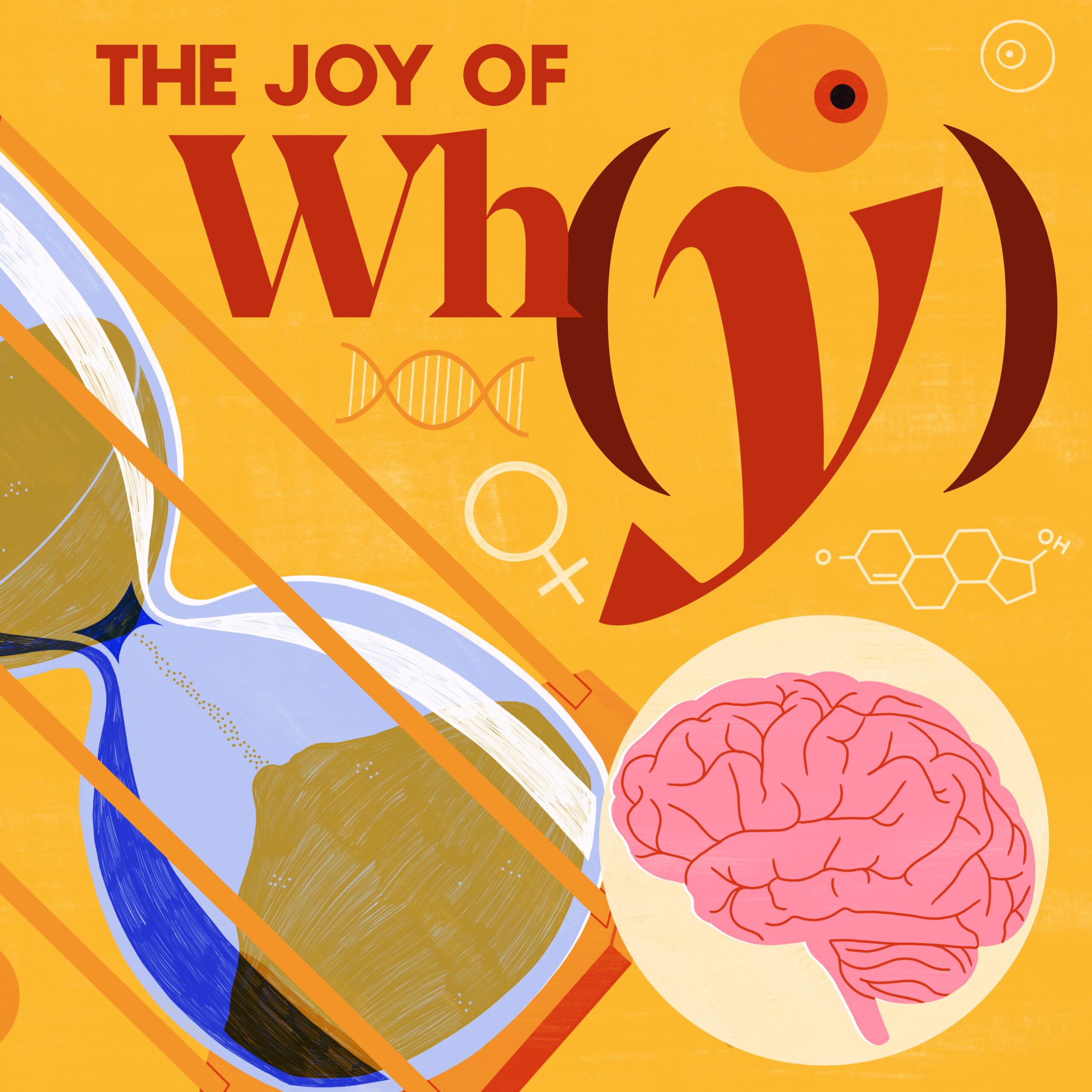
The Joy of WhyWhy Do We Get Old, and Can Aging Be Reversed?Everybody gets older, but not everyone ages in the same way. In this episode, Steven Strogatz speaks with Judith Campisi and Dena Dubal, two biomedical researchers who study the causes and outcomes of aging, to understand how age works - and what scientists know about postponing or even reversing the aging process.
2022-07-2738 min
The Joy of WhyHow Do Mathematicians Know Their Proofs Are Correct?Just as scientists test hypotheses, mathematicians prove or disprove conjectures. But what makes a proof stronger than a guess? What does evidence look like in the world of mathematics? Hear Melanie Matchett Wood, professor of mathematics at Harvard University, explain how probability helps to guide number theorists toward certainty.
2022-07-1328 min
The Joy of WhyCan Computers Be Mathematicians?Artificial intelligence has bested humans at problem-solving tasks including games like chess and Go. Is mathematics research next? Steven Strogatz speaks with Kevin Buzzard, professor of pure mathematics at Imperial College London, to learn about the ongoing multidisciplinary effort to translate math into language that computers understand.
2022-06-2932 min
The Joy of WhyWhat Is Life?Without a good definition of life, how do we look for it on alien planets? Steven Strogatz speaks with Robert Hazen, a mineralogist and astrobiologist, and Sheref Mansy, a chemist, to learn more.
2022-06-1541 min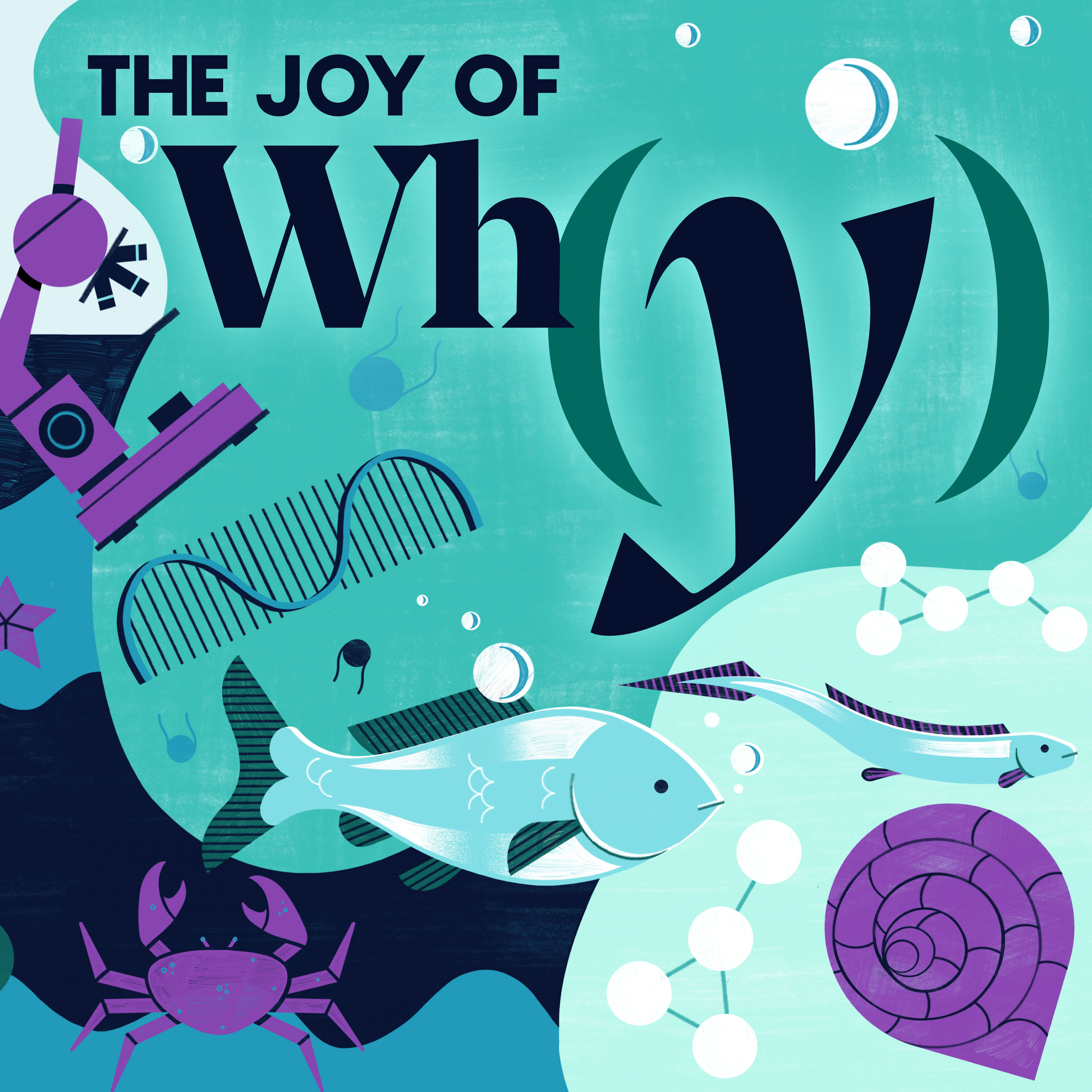
The Joy of WhyHow Could Life Evolve From Cyanide?How did life arise on Earth? It's one of the greatest and most ancient mysteries in all of science - and the clues to solving it are all around us. Steven Strogatz speaks with Jack Szostak, a Nobel Prize-winning biologist, and Betül Kaçar, a paleogeneticist and astrobiologist, to explore our best understanding of how we all got here.
2022-06-0139 min
The Joy of WhyWill the James Webb Space Telescope Reveal Another Earth?With the December 2021 launch of the James Webb Space Telescope, one of the most expensive and ambitious scientific initiatives ever attempted commenced operations. Now that the telescope has been successfully deployed in its unique position in space, its advanced instruments will be able to gather data on questions that scientists once could only dream of answering. Is there life on other planets? How do supermassive black holes mold the mass in their galaxies? JWST may soon be able to tell us. In this episode, host Steven Strogatz speaks to two researchers leading JWST's observations of our universe: Marcia Rieke...
2022-05-1849 min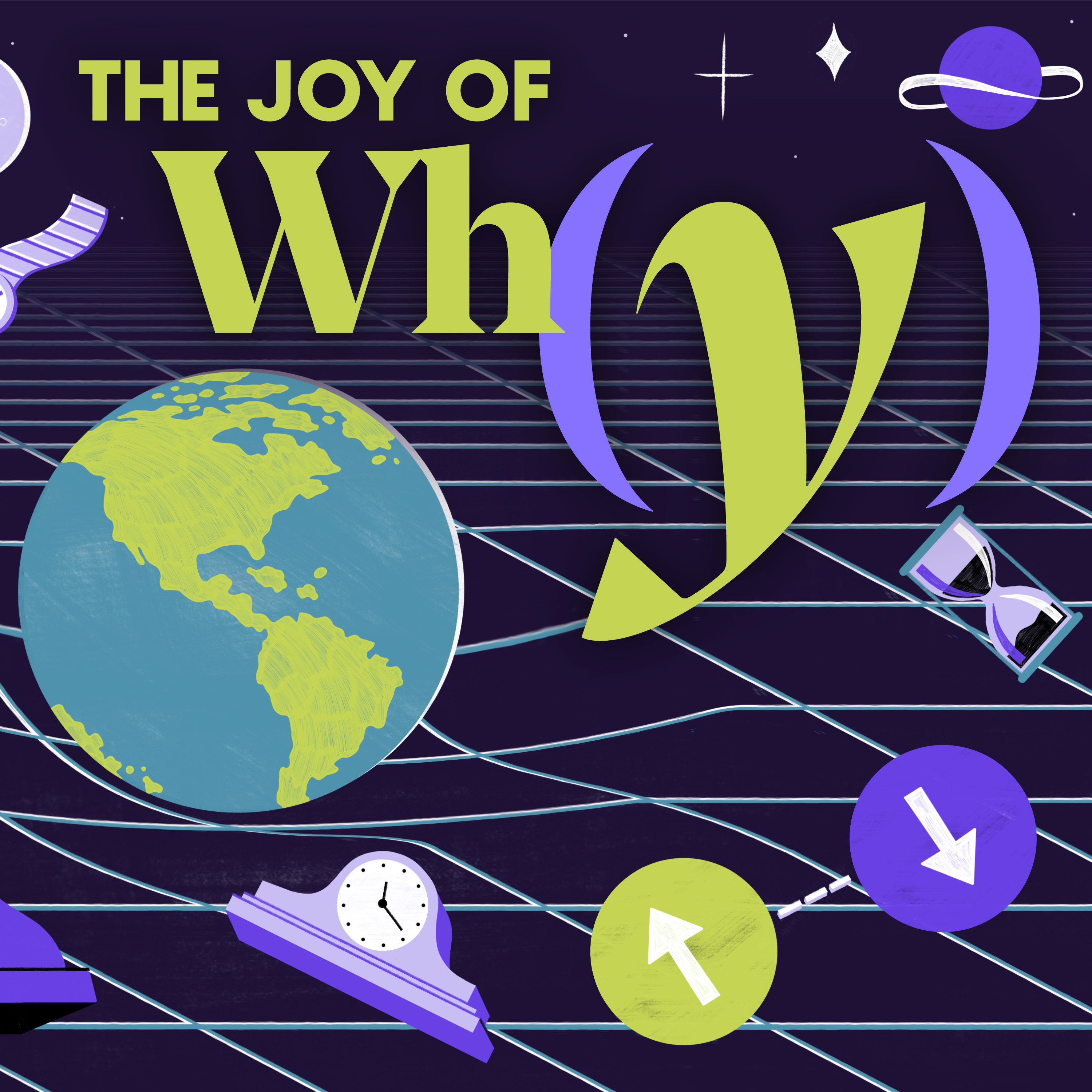
The Joy of WhyWhere Do Space, Time and Gravity Come From?Einstein's description of gravity as a curvature in space-time doesn't easily mesh with a universe made up of quantum wavefunctions. Theoretical physicist Sean Carroll (of the "Mindscape" podcast) tells Steven Strogatz about the mind-bending implications of the quest for quantum gravity.
2022-05-0442 min
The Joy of WhyWhy Is Inflammation a Dangerous Necessity?We've heard a lot about the immune system during the COVID-19 pandemic, but of course our immune system fights off much more than the coronavirus. And while the immune system protects us brilliantly from countless pathogens every day, sometimes it can also attack our own bodies, causing harmful and even deadly inflammation. In this episode, host Steven Strogatz speaks with Shruti Naik, an immunologist and assistant professor of biological sciences at NYU's Langone Medical Center, to learn why the immune system works so well - and how that effectiveness can backfire.
2022-04-2040 min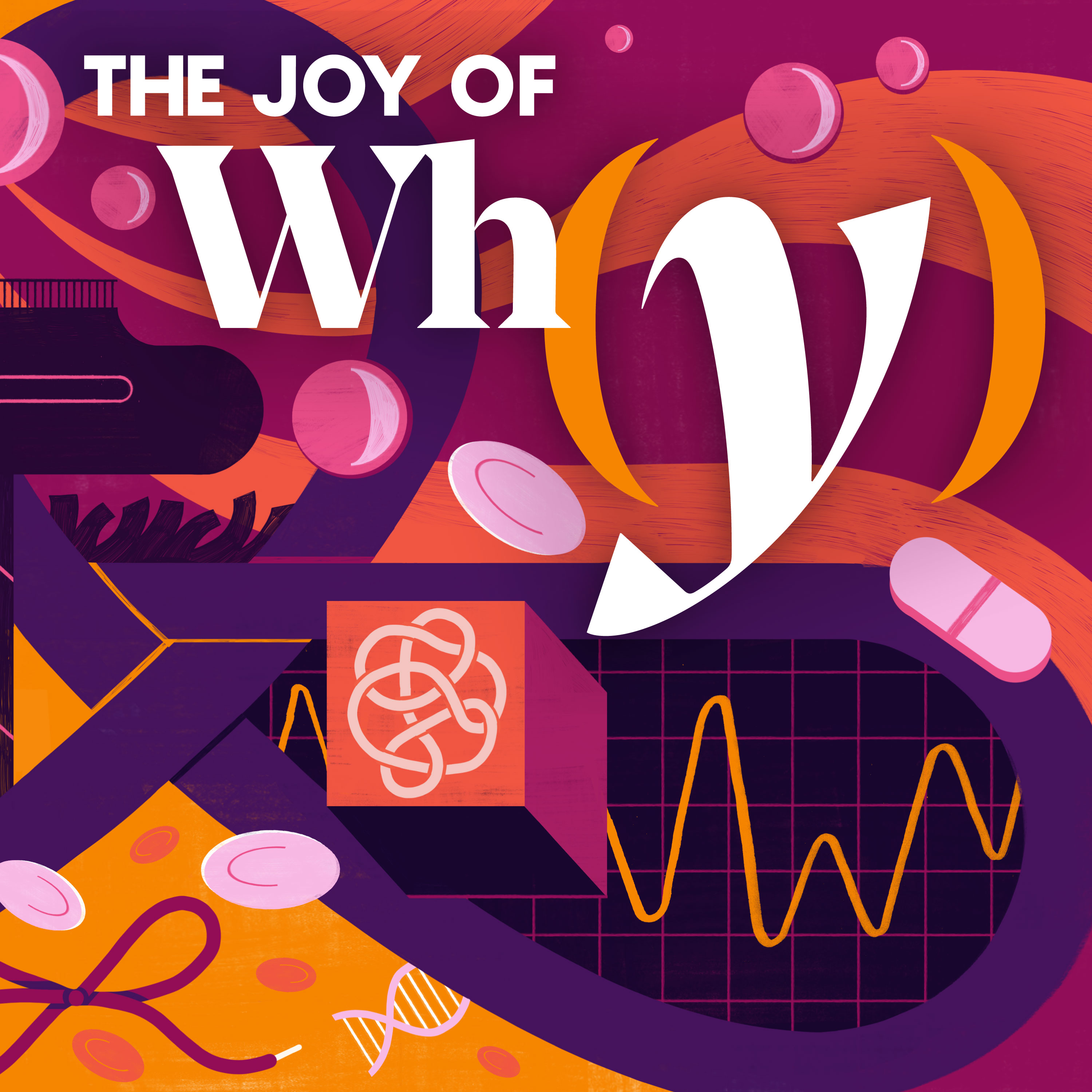
The Joy of WhyUntangling Why Knots Are ImportantEveryone knows what a knot is. But they have special significance in math and science because their properties can help unlock hidden secrets like the biochemistry of DNA or the geometry of three-dimensional spaces. In this episode, Steven Strogatz explores the mysteries of knots with the mathematicians Colin Adams and Lisa Piccirillo.
2022-04-0644 min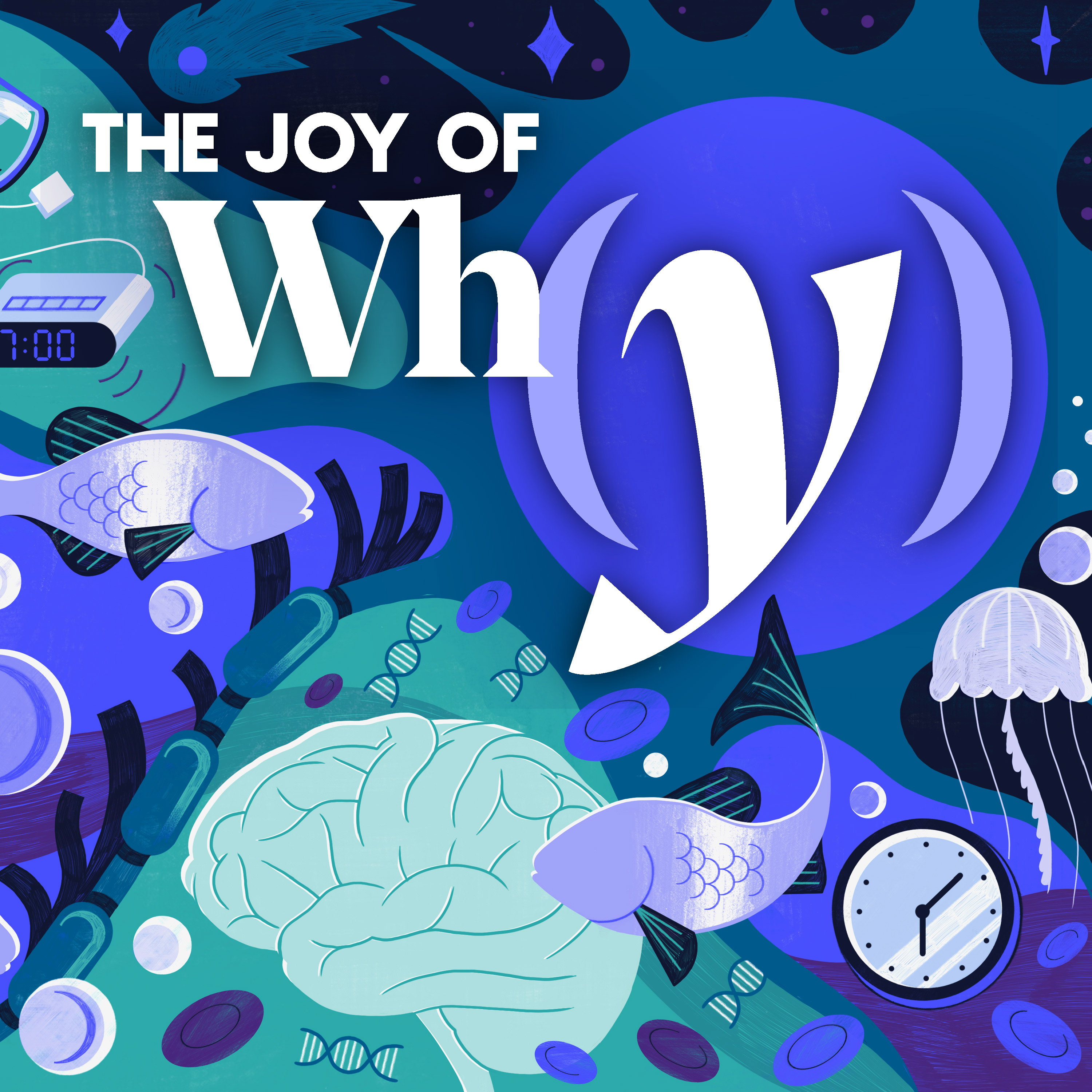
The Joy of WhyWhy Do We Die Without Sleep?Why do we need sleep? In the search for answers, scientists have uncovered more thought-provoking mysteries central to what sleep is, how it evolved and the benefits that it provides. In this episode, the mathematician and science communicator Steven Strogatz speaks with Dragana Rogulja, an assistant professor of neurobiology at Harvard Medical School who recently discovered how sleep deprivation causes death in fruit flies, and Alex Keene, a neurogeneticist at Texas A and M University studying cave fish to understand sleep's evolutionary history.
2022-03-2343 min
The Joy of WhyTrailer: The Joy of WhyAn introduction to the new Quanta Magazine podcast The Joy of Why, in which noted mathematician and author Steven Strogatz talks with experts about some of the greatest scientific questions of all time.
2022-03-1702 min
The Joy of xEve Marder on the Crucial Resilience of NeuronsEve Marder’s research into the plasticity and resilience of nervous systems finds universal principles guiding life’s responses to stress. The post Eve Marder on the Crucial Resilience of Neurons first appeared on Quanta Magazine
2021-05-1740 min
The Joy of xCharlie Marcus Knows That Quantum Facts Aren’t ComplicatedThe secret to making a qubit for future quantum computers might depend on knowing how to tie knots in unusual materials, argues the physicist Charlie Marcus. The post Charlie Marcus Knows That Quantum Facts Aren’t Complicated first appeared on Quanta Magazine
2021-05-1049 min
The Joy of xAmie Wilkinson Sees the Dynamic Chaos in Puff PastryTo a dynamicist like Amie Wilkinson, understanding the universe is about knowing all the right moves. The post Amie Wilkinson Sees the Dynamic Chaos in Puff Pastry first appeared on Quanta Magazine
2021-05-0342 min
The Joy of xEmery Brown and the Truth About AnesthesiaAnesthesia is very different from sleep — which is why it offers unique opportunities for studying the human brain, says the physician-researcher and statistician Emery Brown. The post Emery Brown and the Truth About Anesthesia first appeared on Quanta Magazine
2021-04-2640 min
The Joy of xMelanie Mitchell Takes AI Research Back to Its RootsTo build a general artificial intelligence, we may need to know more about our own minds, argues the computer scientist Melanie Mitchell. The post Melanie Mitchell Takes AI Research Back to Its Roots first appeared on Quanta Magazine
2021-04-1940 min
The Joy of xTrachette Jackson Fights Cancer With MathQuantitative models built by the mathematical biologist Trachette Jackson can make cancer therapies safer and more effective. The post Trachette Jackson Fights Cancer With Math first appeared on Quanta Magazine
2021-04-1242 min
The Joy of xRediet Abebe on Using Algorithms for Social JusticeThe computer scientist Rediet Abebe’s passion for applied mathematics closely aligns with her passion to solve problems with poverty and social inequality. The post Rediet Abebe on Using Algorithms for Social Justice first appeared on Quanta Magazine
2021-04-0543 min
The Joy of xFederico Ardila on Math, Music and the Space of PossibilitiesThe mathematician Federico Ardila takes a creative approach to the search for useful answers hiding among inconceivably huge numbers of possible ones. The post Federico Ardila on Math, Music and the Space of Possibilities first appeared on Quanta Magazine
2021-03-2950 min
The Joy of xSharon Glotzer’s Deep Curiosity About Order From ChaosThe computational physicist Sharon Glotzer finds unifying principles that structure the chaotic dance of the particles that make up matter. The post Sharon Glotzer’s Deep Curiosity About Order From Chaos first appeared on Quanta Magazine
2021-03-2248 min
The Joy of xFrank Wilczek on the Strong Force, Quarks and Dark MatterThe theoretical physicist Frank Wilczek explained what holds atomic nuclei together, and he is still pushing at the limits of what the standard model can tell us. The post Frank Wilczek on the Strong Force, Quarks and Dark Matter first appeared on Quanta Magazine
2021-03-1548 min
The Joy of xBonnie Bassler on Talkative Bacteria and Eavesdropping VirusesThe molecular biologist Bonnie Bassler is deciphering the chemical languages that bacteria use to coordinate their assaults on a host. The post Bonnie Bassler on Talkative Bacteria and Eavesdropping Viruses first appeared on Quanta Magazine
2021-03-0839 min
The Joy of xNeil Shubin on Tiktaalik, Ballistic Tongues and EvolutionThe paleontologist Neil Shubin talks with host Steven Strogatz about hunting for a 375 million-year-old fossil and finding novel traits that evolved many times. The post Neil Shubin on Tiktaalik, Ballistic Tongues and Evolution first appeared on Quanta Magazine
2021-03-0247 min
The Joy of xPodcast Preview: The Joy of x, Season TwoHosted by Steven Strogatz, The Joy of x podcast is back with new episodes that explore the inner worlds of top-tier scientists and mathematicians like Frank Wilczek, Bonnie Bassler and Amie Wilkinson. The post Podcast Preview: The Joy of x, Season Two first appeared on Quanta Magazine
2021-02-2302 min
The Joy of xMoon Duchin on Fair Voting and Random WalksCan geometry save democracy from gerrymandering? Mathematician Moon Duchin discusses the possibilities with host Steven Strogatz. The post Moon Duchin on Fair Voting and Random Walks first appeared on Quanta Magazine
2020-04-0750 min
The Joy of xBrian Keating’s Quest for the Origin of the UniverseThe astrophysicist Brian Keating talks to host Steven Strogatz about chasing the universe’s greatest mysteries — and what it’s like to have a major discovery slip through his fingers. The post Brian Keating’s Quest for the Origin of the Universe first appeared on Quanta Magazine
2020-03-3141 min
The Joy of xRebecca Goldin and Brian Nosek on Hard Truths in Math and PsychologyThe mathematician Rebecca Goldin and the psychology researcher Brian Nosek speak with host Steven Strogatz about what it’s like to be the bearers of unpopular truths. The post Rebecca Goldin and Brian Nosek on Hard Truths in Math and Psychology first appeared on Quanta Magazine
2020-03-2446 min
The Joy of xCori Bargmann on the Genetics of Transparent Worms, Supertasters and CancerThe neurogenetics pioneer Cori Bargmann speaks with host Steven Strogatz about why a transparent worm became her favorite animal and how a genetic discovery she made inspired a revolutionary cancer treatment. The post Cori Bargmann on the Genetics of Transparent Worms, Supertasters and Cancer first appeared on Quanta Magazine
2020-03-1753 min
The Joy of xTadashi Tokieda's Special Kind of MagicThe mathematician Tadashi Tokieda and host Steven Strogatz explore what we can learn about the world from simple “toys” with remarkable physical or mathematical properties. The post Tadashi Tokieda’s Special Kind of Magic first appeared on Quanta Magazine
2020-03-1051 min
The Joy of xJanna Levin on Seeing and Hearing Black HolesThe astrophysicist Janna Levin describes the fierce scientific beauty she finds in black holes and reveals why she took a major risk early in her career. The post Janna Levin on Seeing and Hearing Black Holes first appeared on Quanta Magazine
2020-03-0354 min
The Joy of xJohn Urschel: From NFL Player to MathematicianJohn Urschel, who retired from playing professional football with the Baltimore Ravens to become a mathematician, talks to host Steven Strogatz about the fascinations of graph theory that lured him away from the NFL. The post John Urschel: From NFL Player to Mathematician first appeared on Quanta Magazine
2020-02-2545 min
The Joy of xCorina Tarnita and the Deep Mathematics of Social InsectsThe mathematical biologist Corina Tarnita explains to host Steven Strogatz how quantitative modeling solved the mystery of fairy circles. The post Corina Tarnita and the Deep Mathematics of Social Insects first appeared on Quanta Magazine
2020-02-1851 min
The Joy of xRobbert Dijkgraaf on Exploring Quantum RealityThe mathematical physicist Robbert Dijkgraaf and host Steven Strogatz discuss the frontiers of string theory and why space and time might not be the most fundamental things in the universe. The post Robbert Dijkgraaf on Exploring Quantum Reality first appeared on Quanta Magazine
2020-02-1149 min
The Joy of xLeslie Vosshall on Designer Mosquitoes and Dude WallsEvents take an interesting turn after the neurogeneticist Leslie Vosshall speaks with host Steven Strogatz about ways to make mosquitoes less deadly and the obstacles facing educational inclusiveness. The post Leslie Vosshall on Designer Mosquitoes and Dude Walls first appeared on Quanta Magazine
2020-02-0458 min
The Joy of xAlex Kontorovich on the Absolute Truth of Pure MathThe mathematician Alex Kontorovich speaks with host Steven Strogatz about regaining his creative freedom in an intimidating collaboration and about the pleasures of spherical geometry. The post Alex Kontorovich on the Absolute Truth of Pure Math first appeared on Quanta Magazine
2020-01-2857 min
The Joy of xPriya Natarajan on Black Holes and Mapping the UniverseIn this episode, Priya Natarajan, professor of astronomy and physics at Yale University, speaks with Steven Strogatz about her lifelong fascinations, including black holes, mapping the universe and early personal computers. The post Priya Natarajan on Black Holes and Mapping the Universe first appeared on Quanta Magazine
2020-01-221h 05
The Joy of xPodcast Preview: Introducing The Joy of xHosted by Steven Strogatz, The Joy of x podcast opens a window into the inner worlds of top-tier scientists and mathematicians while shining light on universal themes like creativity, collaboration or navigating professional challenges. The post Podcast Preview: Introducing The Joy of x first appeared on Quanta Magazine
2020-01-1502 min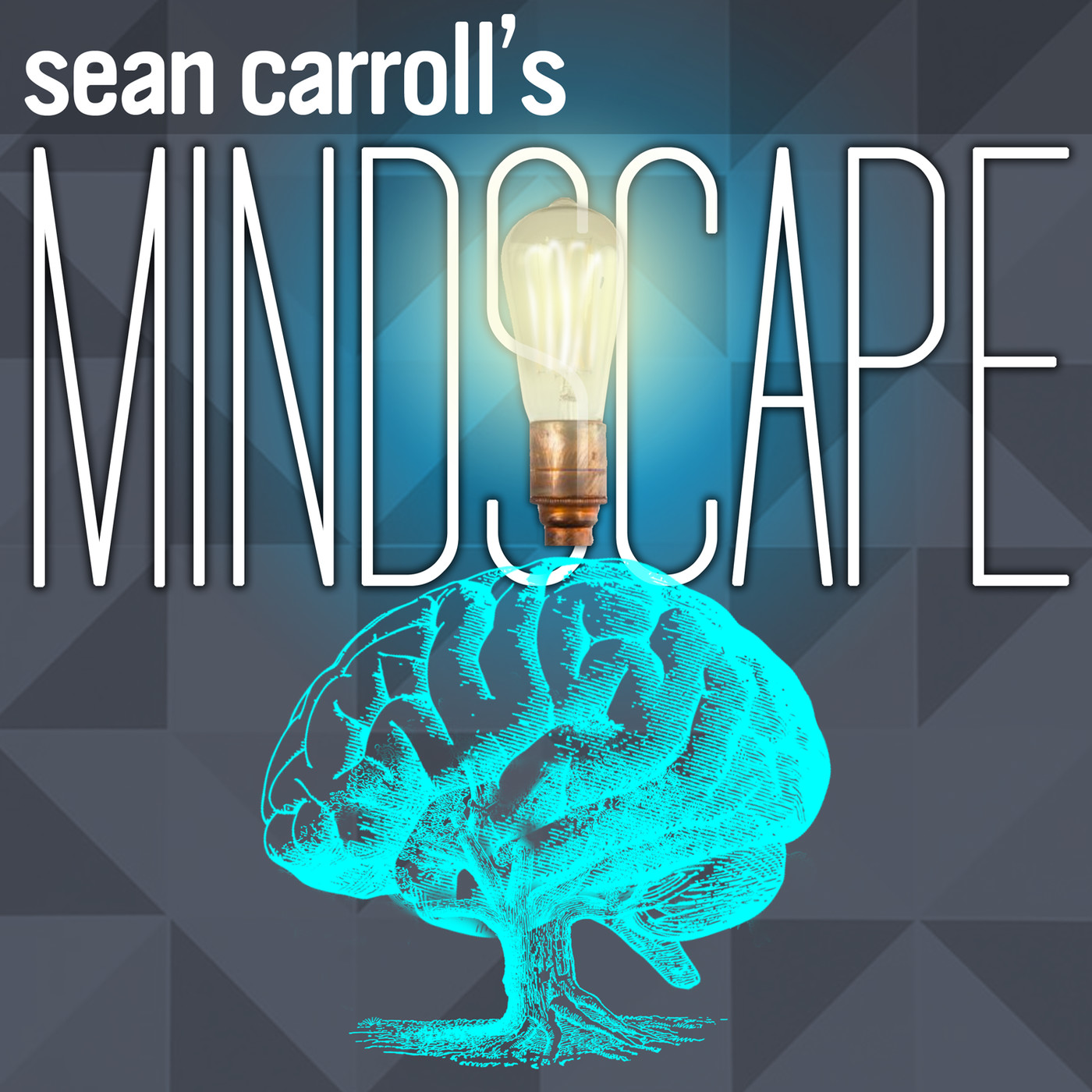
Sean Carroll's Mindscape: Science, Society, Philosophy, Culture, Arts, and IdeasSteven Strogatz on Synchronization, Networks, and the Emergence of Complex BehaviorOne of the most important insights in the history of science is the fact that complex behavior can arise from the undirected movements of small, simple systems. Despite the fact that we know this, we're still working to truly understand it — to uncover the mechanisms by which, and conditions under which, complexity can emerge from simplicity. (Coincidentally, a new feature in Quanta on this precise topic came out while this episode was being edited.) Steven Strogatz is a leading researcher in this field, a pioneer both in the subject of synchronization and in that of small-world networks. He's also an av...
2019-04-081h 14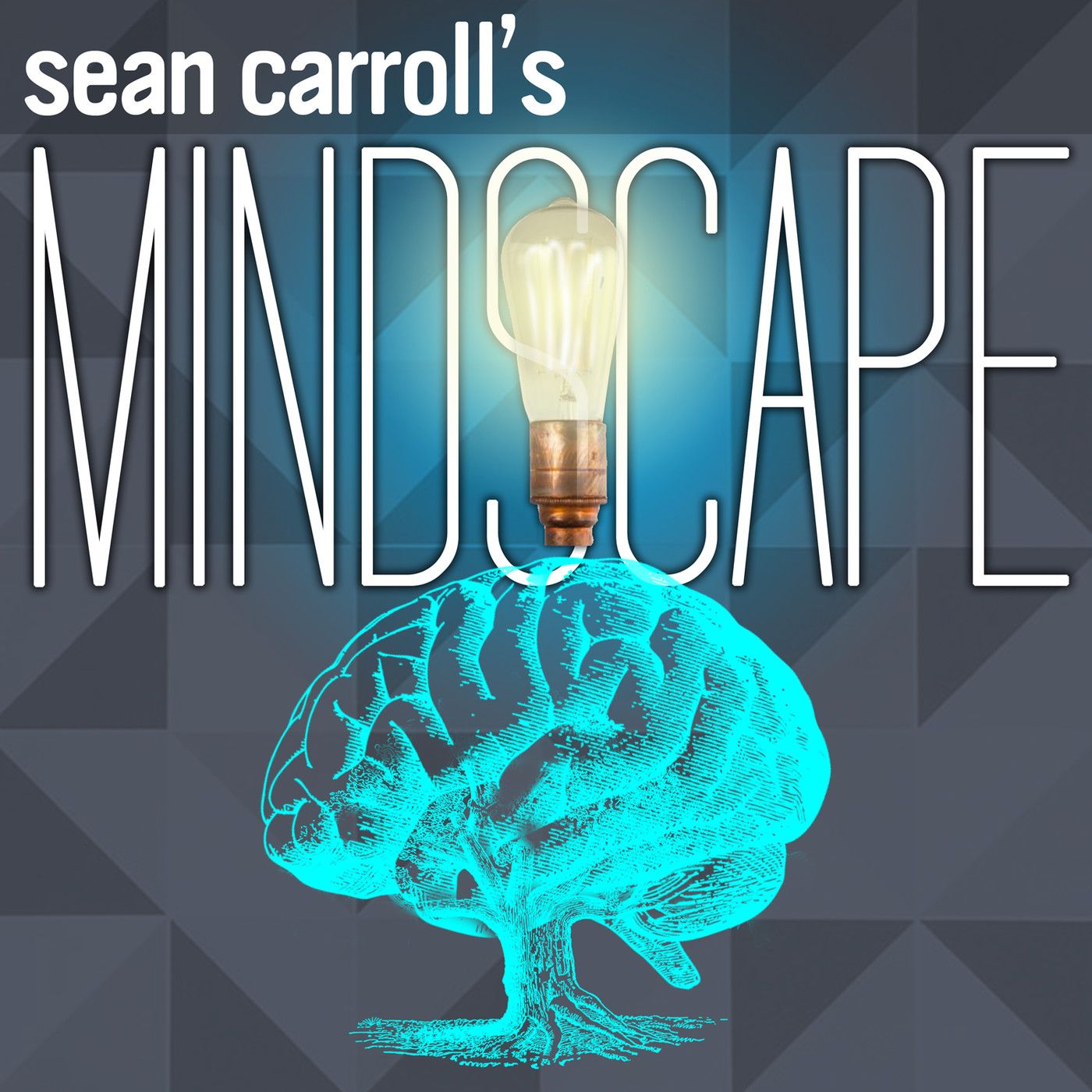
Sean Carroll's Mindscape41 | Steven Strogatz on Synchronization, Networks, and the Emergence of Complex BehaviorOne of the most important insights in the history of science is the fact that complex behavior can arise from the undirected movements of small, simple systems. Despite the fact that we know this, we’re still working to truly understand it — to uncover the mechanisms by which, and conditions under which, complexity can emerge from simplicity. (Coincidentally, a new feature in Quanta on this precise topic came out while this episode was being edited.) Steven Strogatz is a leading researcher in this field, a pioneer both in the subject of synchronization and in that of small-world networks. He’s also a...
2019-04-081h 14